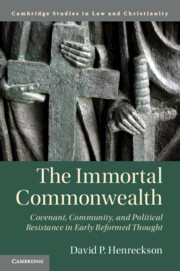Description
The Immortal Commonwealth
Covenant, Community, and Political Resistance in Early Reformed Thought
Law and Christianity Series
Author: Henreckson David P.
Reveals how early modern religious conceptions of covenant and community were deployed for surprisingly radical political ends.
Language: English
Subject for The Immortal Commonwealth:
Approximative price 28.98 €
In Print (Delivery period: 14 days).
Add to cart
The Immortal Commonwealth
Publication date: 06-2022
Support: Print on demand
Publication date: 06-2022
Support: Print on demand
Approximative price 120.25 €
In Print (Delivery period: 14 days).
Add to cart
The Immortal Commonwealth
Publication date: 07-2019
218 p. · 15.6x23.4 cm · Hardback
Publication date: 07-2019
218 p. · 15.6x23.4 cm · Hardback
Description
/li>Contents
/li>Biography
/li>
In the midst of intense religious conflict in the late sixteenth and early seventeenth century, theological and political concepts converged in remarkable ways. Incited by the slaughter of French Protestants in the Saint Bartholomew's Day Massacre, Reformed theologians and lawyers began to marshal arguments for political resistance. These theological arguments were grounded in uniquely religious conceptions of the covenant, community, and popular sovereignty. While other works of historical scholarship have focused on the political and legal sources of this strain of early modern resistance literature, The Immortal Commonwealth examines the frequently overlooked theological sources of these writings. It reveals how Reformed thinkers such as Heinrich Bullinger, John Calvin, Theodore Beza, and Johannes Althusius used traditional theological conceptions of covenant and community for surprisingly radical political ends.
Introduction; 1. The covenanting God; 2. The law of the covenant; 3. Breaking covenant; 4. The unaccountable sovereign; 5. Consociational politics; 6. Resisting the devil.
David P. Henreckson is Assistant Professor of Theology at Dordt College, Iowa, and serves as director of the Andreas Center for Reformed Scholarship and Service. His research interests include early modern religion and politics, resistance theory, secularity, and Christian ethics. His work has appeared in peer-reviewed journals such as the Journal of the Society of Christian Ethics, Studies in Christian Ethics, and the Journal of Reformed Theology, as well as magazines such as Comment and Political Theology Today. He is a contributing editor at Comment.
© 2024 LAVOISIER S.A.S.

